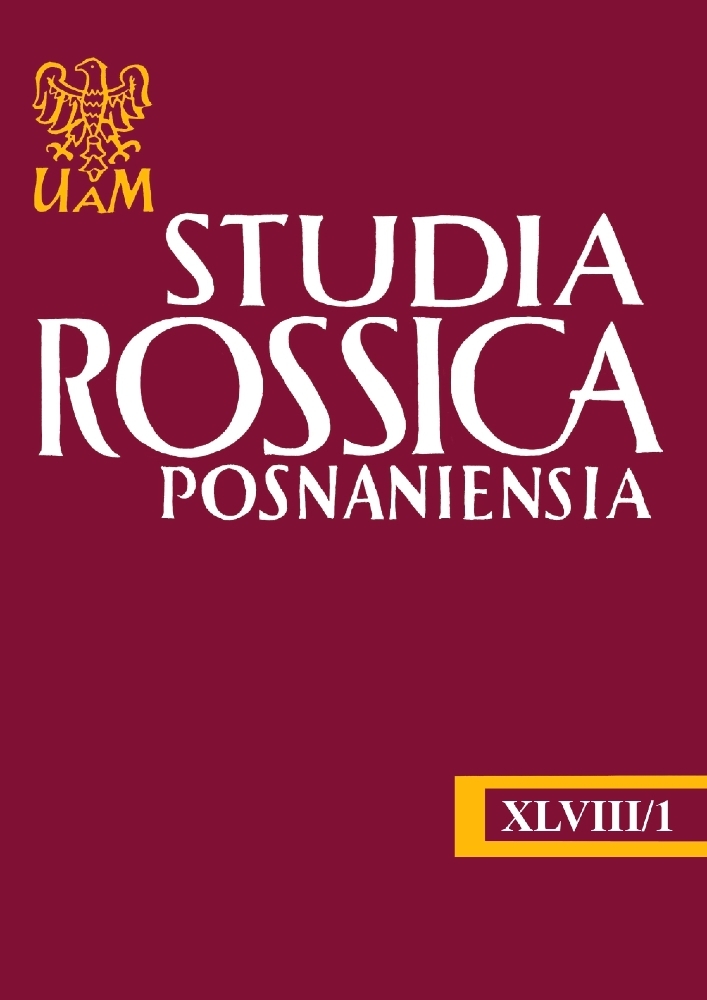Abstrakt
This paper focuses on the concept of boredom in the creative work of one of the significant figures of Soviet underground culture – Elena Shvarts. All the creative heritage – both poetic and prosaic – is treated like a semiotic unity, so that it is possible to see the evolution in understanding such a notion during more than five decades of the poet’s life. While analyzing the five-volume collection by Shvarts, statistical calculation has revealed only 28 cases of using the concept. Even though for Shvarts’s lyrical subjects, who are usually passionate and ecstatically active, boredom is not specific at all, the author sometimes puts this concept in the meaningful center of her creative universe. It could be done both explicably and implacably through the description of “boring” landscapes and events. After close reading of the texts from the five-volume collection, it is claimed that boredom in Shvarts’s oeuvre is strictly associated to the physical (and\or physiological) world, with its routines, wishes and activities. To the contrast, the transcendental world and everything connected to the sacrum, according to Elena Shvarts, cannot be boring.
Bibliografia
Bolʹšoj tolkovyj slovarʹ russkogo âzyka. Red. Sergej Kuznecov. Sankt-Peterburg, Norint, 1998. Web. 24.10.2021. http://www.gramota.ru/slovari/info/bts/.
Bunturi, Vlada. „Zdesʹ vsë tak tonko, tak intellektualʹno…”. Paradigma. Filosofsko-kulʹturologičeskij alʹmanah, 18, 2011, s. 89–101.
Karasik, Vladimir. „Kulʹturnye dominanty v âzyke”. Âzykovaâ ličnostʹ: kulʹturnye koncepty. Red. Vladimir Karasik. Volgograd-Arhangelʹsk, Peremena, 1996, s. 3–16.
Karasik, Vladimir. „O kategoriâh lingvokulʹturologii”. Âzykovaâ ličnostʹ: problemy kommunikativnoj deâtelʹnosti. Red. Vladimir Karasik. Volgograd, Peremena, 2001, s. 3–17.
Larousse. Web. 24.10.2021. https://www.larousse.fr/dictionnaires/francais/délicieux/23086.
Le Parisien. Web. 24.10.2021. https://citation-celebre.leparisien.fr/citations/17863.
Poèziâ – èto razgovor samogo âzyka [Intervʹû s Viktorom Krivulinym]. Web. 24.10.2021. http://ruthenia.ru/60s/leningrad/krivulin/interview.htm.
Popovic, Dunja. „Symbolic injury and embodied mysticism in Elena Shvarts’s «Trudy i dni Lavinii»”. The Slavic and East European Journal, 4, 2007, s. 753–771. DOI: https://doi.org/10.2307/20459572
Švarc, Elena. „«Denʹ božʹih korovok»: neizdannye stihi 1990-h godov”. Vozduh, 3–4, 2016, s. 157–163.
Švarc, Elena. Dikopisʹ poslednego vremeni. Sankt-Peterburg, Puškinskij fond, 2001. Web. 24.10.2021. http://www.vavilon.ru/texts/shvarts4.html.
Švarc, Elena. Sočineniâ Eleny Švarc. Sankt-Peterburg, Puškinskij fond, t. 1, 2002a.
Švarc, Elena. Sočineniâ Eleny Švarc. Sankt-Peterburg, Puškinskij fond, t. 2, 2002b.
Švarc, Elena. Sočineniâ Eleny Švarc. Sankt-Peterburg, Puškinskij fond, t. 3, 2008a.
Švarc, Elena. Sočineniâ Eleny Švarc. Sankt-Peterburg, Puškinskij fond, t. 4, 2008b.
Švarc, Elena. Sočineniâ Eleny Švarc. Sankt-Peterburg, Puškinskij fond, t. 5, 2013.
Vorontsova, Kristina. „Alkogolʹnaâ karta Sankt-Peterburga: «Obezʹânʹi pryžki» Eleny Švarc i «Drugoj Peterburg» Džona Nikolsona”. Pejzaż / Krajobraz / Przestrzeń. Język i tekst. Red. Maria Długołęcka-Pietrzak, Aldona Kocyła-Łukasiewicz. Siedlce, [i]WN IKRiBL, 2018, s. 57–88.
Voroncova, Kristina. „Prostranstvo – vremâ – androgin…”: Modeli prostranstva v poèzii Eleny Švarc. Kraków, Wydawnictwo Uniwersytetu Jagiellońskiego, 2016.
Zitzewitz, Josephine. Poetry and the Leningrad Religious-Philosophical Seminar 1974–1980. Music for a Deaf Age. Leeds, Legenda, 2015.
Žarnikova, Svetlana. „Obrazy vodoplavaûŝih ptic v russkoj narodnoj tradicii (Istoki i genezis)”. Kulʹtura Russkogo Severa. Red. Aleksandr Bašenʹkin. Vologda, Izdanie VGPI, 1994, s. 108–119.
Licencja
Prawa autorskie (c) 2023 Kristina Vorontsova

Utwór dostępny jest na licencji Creative Commons Uznanie autorstwa – Użycie niekomercyjne – Na tych samych warunkach 4.0 Międzynarodowe.

